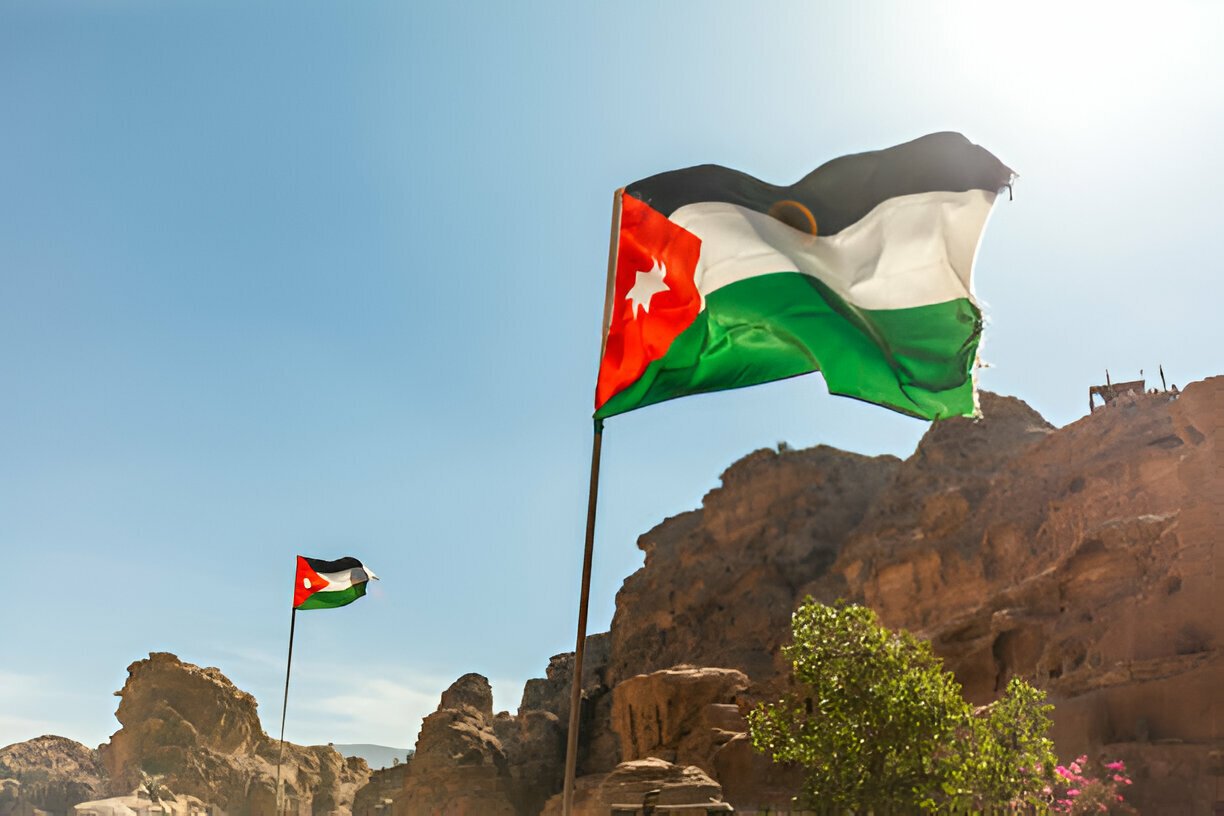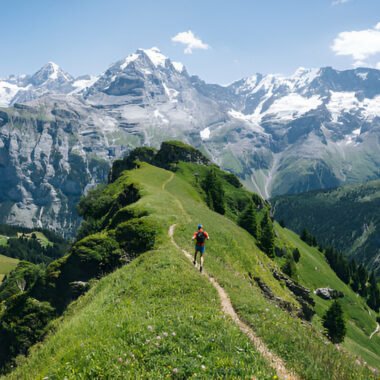Table of Contents
Jordan, a jewel of the Middle East, is renowned for its rich history, stunning landscapes, and warm hospitality. From the bustling capital of Amman to the ancient city of Petra, each destination offers a unique glimpse into the country’s vibrant culture and heritage. Whether you’re a history buff, an adventure seeker, or simply looking for a new travel experience, Jordan has something to offer. Let’s dive into the top 5 cities in Jordan that you simply can’t miss.
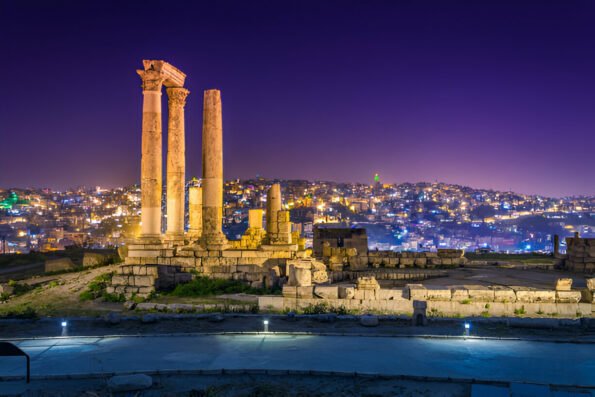
Amman: The Capital City
History and Significance
Amman, the capital of Jordan, is a city that beautifully blends ancient history with modernity. It has been continuously inhabited since the Neolithic period and has seen the rise and fall of many civilizations, including the Romans, Byzantines, and Umayyads.
Key Attractions
Roman Amphitheatre
One of Amman’s most iconic landmarks, the Roman Amphitheatre dates back to the 2nd century AD. This ancient structure can hold up to 6,000 spectators and is still used today for cultural events and performances.
Citadel
Perched atop one of Amman’s seven hills, the Citadel offers panoramic views of the city. It houses several significant archaeological sites, including the Temple of Hercules and the Umayyad Palace.
Rainbow Street
For a taste of modern Amman, head to Rainbow Street. This vibrant area is lined with cafes, restaurants, and shops, making it a perfect spot for a leisurely stroll and some people-watching.
Local Cuisine and Markets
Amman is a food lover’s paradise. Don’t miss the chance to try local dishes like mansaf (a traditional Jordanian dish made of lamb, yogurt sauce, and rice) and falafel. For a truly local experience, visit the bustling Al Balad market.
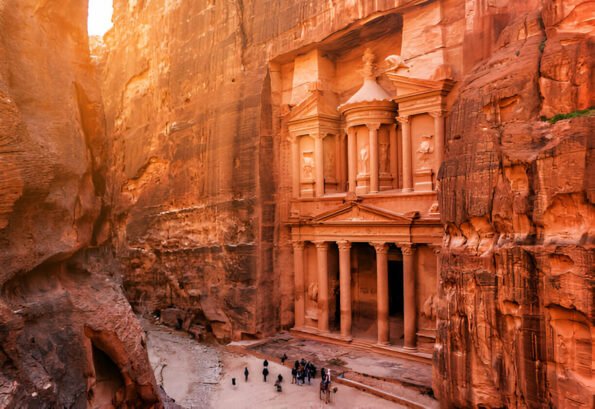
Petra: The Ancient Wonder
Historical Background
Petra, often referred to as the “Rose City” due to the color of its stone, is one of the most famous archaeological sites in the world. It was the capital of the Nabataean Kingdom and a major trading hub in ancient times.
Main Highlights
Al-Khazneh (The Treasury)
The Treasury is arguably Petra’s most famous landmark. Carved into a sandstone cliff, this majestic structure was originally a mausoleum but later became associated with the legend of hidden treasures.
Monastery (Ad Deir)
A strenuous hike will lead you to the Monastery, another magnificent structure carved into the rock. It’s larger but less ornate than the Treasury and offers stunning views of the surrounding landscape.
Siq (The Main Entrance)
The Siq is a narrow gorge that serves as the main entrance to Petra. Walking through this winding pathway, with its towering cliffs on either side, is a magical experience that culminates in the breathtaking view of the Treasury.
Tips for Visiting Petra
To make the most of your visit, plan to arrive early in the morning or late in the afternoon to avoid the crowds. Wear comfortable shoes, stay hydrated, and consider hiring a local guide to enhance your understanding of Petra’s history.
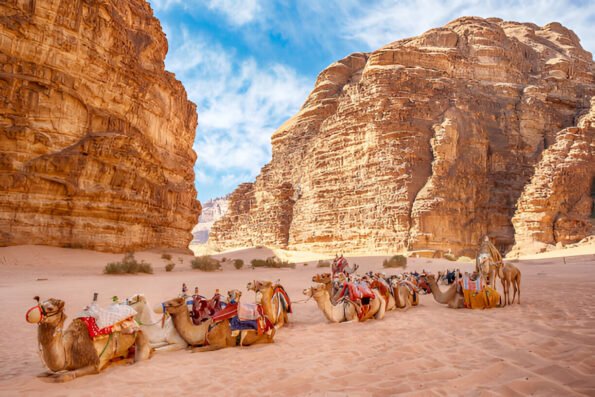
Wadi Rum: The Valley of the Moon
Unique Landscape and Geology
Wadi Rum, also known as the Valley of the Moon, is a vast desert landscape characterized by its towering sandstone mountains, sweeping sand dunes, and unique rock formations. It’s a place of stunning natural beauty and a favorite among adventure seekers.
Activities to Do
Jeep Tours
A jeep tour is the best way to explore Wadi Rum’s vast expanse. You’ll get to see iconic sites like the Seven Pillars of Wisdom and the Burdah Rock Bridge.
Camel Rides
For a more traditional experience, consider a camel ride through the desert. It’s a peaceful way to take in the surreal landscape and connect with the Bedouin way of life.
Stargazing
Wadi Rum’s clear skies and lack of light pollution make it an ideal spot for stargazing. Many camps offer guided stargazing tours where you can marvel at the Milky Way and other celestial wonders.
Bedouin Culture and Camps
Staying in a Bedouin camp is a highlight of any visit to Wadi Rum. You’ll experience traditional hospitality, enjoy authentic Bedouin cuisine, and learn about the nomadic lifestyle that has endured in this harsh environment for centuries.

Aqaba: The Coastal Gem
Overview of Aqaba’s Significance
Aqaba is Jordan’s only coastal city, located on the northern tip of the Red Sea. It’s a vibrant resort town known for its beautiful beaches, crystal-clear waters, and rich marine life.
Beaches and Water Activities
Snorkeling and Diving
Aqaba is a paradise for snorkelers and divers. The coral reefs here are teeming with colorful fish and other marine life. Popular dive sites include the Japanese Garden and the Cedar Pride shipwreck.
Aqaba Marine Park
This protected area is dedicated to preserving the marine environment. It’s a great place for snorkeling and diving, with numerous underwater attractions and diverse marine species.
Historical Sites
Aqaba Fort
Also known as Mamluk Castle, Aqaba Fort dates back to the 14th century. It’s a fascinating historical site that offers insights into the city’s past.
Ayla City
The ancient city of Ayla, located near modern-day Aqaba, was one of the first Islamic cities outside the Arabian Peninsula. Archaeological remains provide a glimpse into its historical significance.
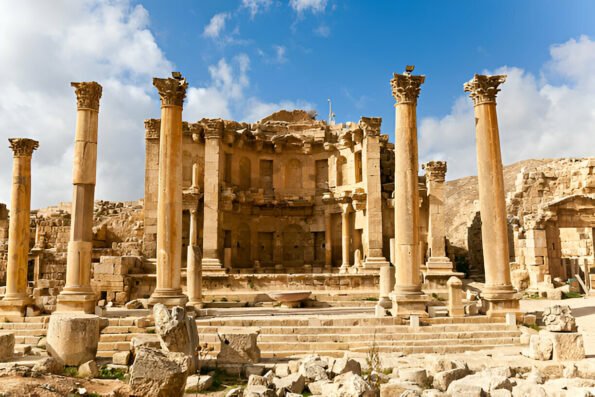
Jerash: The City of Ancient Ruins
Historical Importance
Jerash, known as the “Pompeii of the East,” is home to some of the best-preserved Roman ruins outside Italy. It offers a fascinating journey back in time to the height of the Roman Empire.
Main Attractions
Hadrian’s Arch
This impressive triumphal arch was built to honor Emperor Hadrian’s visit to Jerash in 129 AD. It’s a striking example of Roman architecture.
Hippodrome
The Hippodrome once hosted chariot races and other spectacles. Today, visitors can watch reenactments of Roman military drills and gladiator fights.
Temple of Artemis
Dedicated to the goddess Artemis, this grand temple is one of Jerash’s most notable landmarks. Its towering columns and intricate carvings are a testament to the city’s ancient splendor.
Annual Festivals and Events
Jerash is known for its annual festivals, particularly the Jerash Festival of Culture and Arts. This event features performances, music, and dance, celebrating Jordanian and international cultures.
Conclusion
Jordan’s top cities each offer unique experiences that cater to a variety of interests. From the historical treasures of Petra and Jerash to the natural wonders of Wadi Rum and Aqaba, and the vibrant city life of Amman, there’s something for every traveler. So pack your bags, embark on an adventure, and discover the magic of Jordan for yourself.
FAQs
What is the best time to visit Jordan?
The best time to visit Jordan is during the spring (March to May) and autumn (September to November) when the weather is mild and pleasant.
Is Jordan safe for tourists?
Yes, Jordan is considered one of the safest countries in the Middle East for tourists. The local people are known for their hospitality and friendliness towards visitors.
What should I wear when visiting Jordan?
While Jordan is relatively liberal, it is respectful to dress modestly, especially when visiting religious sites. For women, this means covering the shoulders and knees. Men should avoid wearing shorts in more conservative areas.
How can I travel between these cities?
Traveling between Jordan’s major cities is convenient by bus, car rental, or private taxi. The country has a good network of roads and public transportation options.
Are there any local customs I should be aware of?
Yes, it’s important to respect local customs and traditions. For instance, always use your right hand for eating and greeting, and remove your shoes when entering someone’s home or a mosque.

